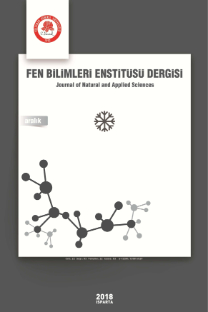Jeofizik Yöntemler ile Yer ve Yapı Etkileşimi
Deprem, Büyütme, İvmeölçer, Spektral Oran, Yer baskın periyod, Girişim
Ground and Structural Interaction Using Geophysical Methods
Earthquake, Amplification, Accelerometer, Spectral Ratio, Ground dominant period, Resonance,
___
- [1] Irikura, K., Iwata, T., Sekiguchi, H., and Pitarka, A.,1996. Lessons from the 1995 Hyogo-Ken Nanbu earthquake: why where such destructive motions generated to buildings? Journal of Natural Disaster Science, 17(2), 99-127.
- [2] Borcherdt R. D., 1970. Effects of Local Geology on Ground Motion Near San Francisco Bay. Bulletin of The Seismological Society of America, 60, 29-61.
- [3] Steidl J. H., Tumarkin A. G., Archuleta R. J., 1996. What is a reference site?. Bull Seism. Soc. Am., 86, 1733-1748.
- [4] Nakamura Y., 1989. A Method for Dynamic Characteristics Estimation of Subsurface Using Microtremor on the Ground Surface. Quarterly Report of the Railway Technical Research Institute, 30(1), 25-33.
- [5] Lermo J., Chavez G. F. J., 1993. Site Effect Evaluation Using Spectral Ratios with Only One Station. Bulletin Seismological Society of America, 83, 1574–1594.
- [6] Yalçınkaya,E., Alptekin,Ö., 2003. Dinar’da zemin büyütmesi ve 1 Ekim 1995 depreminde gözlenen hasarla ilişkisi. Hacettepe Üniversitesi, Yerbilimleri Uygulama ve Araştırma Merkezi Bülteni,27,1-13.
- [7] Gök E., Keçecioğlu M., Çeken U., Polat O., 2012. İzmirnet İstasyonlarında Standart Spektral Oran Yöntemi Kullanılarak Zemin Transfer Fonksiyonlarının Hesaplanması. Dokuz Eylül Üniversitesi, Mühendislik Fakültesi, Mühendislik Bilimleri Dergisi, 14(41), 1-11.
- [8] Uyanık O., Çatlıoğlu B., Uyanık NA., Öncü Z., Sabbağ N., 2012a. Kentsel Dönüşüm Projelerinde Betonarme Yapıların Beton Kalitesinin Sismik Ultrasonik Hızlardan Belirlenmesi. 1.Yerbilimleri Sempozyumu, 18-20 Ekim, Isparta, 147-151.
- [9] Uyanık O., Sabbağ N., Çatlıoğlu B., Uyanık NA., Öncü Z., 2012b. Sismik Ultrasonik Hızlardan Kayaçların Kırıklılık Ve Fissür İndekslerinin Belirlenmesi. 1. Yerbilimleri Sempozyumu, 18-20 Ekim, Isparta, 159-164.
- [10] Uyanık O., Çatlıoğlu B., Sabbağ N., Öncü Z., Uyanık NA., 2012c. Kayaçların Fiziksel Özellikleri İle Sismik Ultrasonik Hızlar Arasındaki İlişkilendirmeler. 1. Yerbilimleri Sempozyumu, Isparta, 165-169.
- [11] Sabbağ N., Uyanık O., 2017. Prediction of Reinforced Concrete Strength by Ultrasonic Velocities. Journal of Applied Geophysics, 141, 13-23.
- [12] Sabbağ, N., Uyanık, O, 2018. Determination of the reinforced concrete strength by electrical resistivity depending on the curing conditions, Journal of Applied Geophysics, 155, 13-25.
- [13] Karabulut, S., Ozel O., Özçep F., 2009. Deprem Tehtidi Altındaki Mühendislik Yapılarının Hakim Titreşim Periyotlarının Belirlenmesinde Yeni Bir Seçenek: Mikrotremor Yöntemi Ve Örnek Uygulaması. New World Sicence Academy, 4(3), 428-441.
- [14] Gosar, A., Roser, J., Sket Motnikar, B. Zupansis, P. 2010. Microtremor study of side effects and soil-structure resonance in the city of Ljubljana (central Slovenia). B. Earthq. Eng., 8, 571–592.
- [15] Uyanık O., 2014. Jeofizik ve Klasik Yöntemlerle Yapı İncelemeleri (Yapı Jeofiziği). JFMO Eğitim Yayınları No:19, s: 80, ISBN:978-605-01-0643-5.
- [16] Timur E., Ozicer S., Sari C., Uyanik O.. 2015. Determination of Buildings Period and Vulnerability Index Using Microtremor Measurements. 8th Congress of the Balkan Geophysical Society (EAGE) 5-8 October 2015, Chania, Greece.
- [17] Öziçer S. 2016. Jeofizik Yöntemler ile Riskli Yapıların Belirlenmesi ve İzmir Örneği. SDÜ Fen Bilimleri Enstitüsü Jeofizik Müh. Anabilim dalı. s:93.
- [18] Öziçer S., Uyanık O., Timur E., 2017. Investigation of Period and Resonance Risk of Buildings with Various Heights Using Microtremor Method. 9th Congress of the Balkan Geophysical Society 5-9 November 2017, Antalya, Turkey
- [19] Özmen, B., 2000, 17 Ağustos 1999 İzmit Körfezi Depreminin Hasar Durumu (Rakamsal Verilerle), TDV/DR 010-53, Türkiye Deprem Vakfı, 132 s.
- [20] McMechan, G.A., Yedlin, M.J., 1981. Analysis of dispersive waves by wave field transformation. Geophysics 46, 869–874.
- [21] Gabriels, P., Snieder, R., Nolet, G., 1987. In situ measurement of shear wave velocity in sediments with higher-mode Rayleigh waves. Geophysical Prospecting 35, 187–196.
- [22] Tselentis, G.-A., Delis, G., 1998. Rapid assessment of S-wave profiles from the inversion of multichannel surface wave dispersion data. Annali di Geofisica 41 (1), 1–15.
- [23] Park, C.B., Miller, R.D., Xia, J., 1999. Multi-channel analysis of surface waves. Geophysics 64 (3), 800–808.
- [24] Dorman, J., Ewing, M., 1962. Numerical inversion of seismic surface wave dispersion data and crust–mantle structure in the New York–Pennsylvania area. Journal of Geophysical Research 67, 5227–5241.
- [25] Uyanık, O., Ekinci B., Uyanık N.A. (2013). Liquefaction analysis from seismic velocities and determination of lagoon limits Kumluca/Antalya example. Journal of Applied Geophysics 95 (2013) 90–103
- [26] Uyanık, O., 2015. Deprem Ağır Hasar Alanlarının Önceden Belirlenmesi ve Şehir Planlaması için Makro ve Mikro Bölgelendirmelerin Önemi. Süleyman Demirel Üniversitesi, Fen Bilimleri Enstitüsü Dergisi, 19(2), 24-38.
- [27] Pitilakis, K., 2004, “Site Effects, Recent Advances in Earthquake Geotechnical Engineering and Microzonation”, Ansal (Ed), Kluwer Academic Publishers, Dordrecht, the Nederland, 354p
- [28] Sesame, 2004. Guidelines for the Implementation of the H/V Spectral Ratio Technique on Ambient Vibrations, Measurements Processing and Interpretation.
- [29] Konno K., Ohmachi T., 1998. Ground-Motion Characteristics Estimated from Spectral Ratio between Horizontal and Vertical Components. Bulletin of the Seismological Society of America, 88, 1, 228-241.
- ISSN: 1300-7688
- Yayın Aralığı: 3
- Başlangıç: 1995
- Yayıncı: Süleyman Demirel Üniversitesi
Mustafa ÇAVUŞ, Özer ÖZDEMİR, Ahmet SEZER
Türkiye’deki Sclerogaster R.Hesse Cinsi için Yeni Bir Kayıt ve Yeni Lokaliteler
Yasin UZUN, Abdullah KAYA, Semiha YAKAR
Sinem Tuğba ŞAHİN TEKİN, Cenker Burak METİN, Yaprak Arzu ÖZDEMİR
Sulu Ortamda N-Heterosiklik Karben/Palladyum Katalizli Suzuki-Miyaura ÇaprazEşleşme Tepkimeleri
Jeofizik Yöntemler ile Yer ve Yapı Etkileşimi
Nalan MUTLU, Hakan Savaş SAZAK
Hiperharmonik Fonksiyon Üzerine
Bazı Fenolik Bileşiklerin Yoğunluk Fonksiyonu Yöntemi ile Antioksidan Aktivitelerinin Tayin Edilmesi
Vildan ENİSOĞLU ATALAY, Hatice OCAK
Patlıcanda (Solanum melongena L.) Mikrospor Kültürü Üzerine Bir Ön Araştırma
